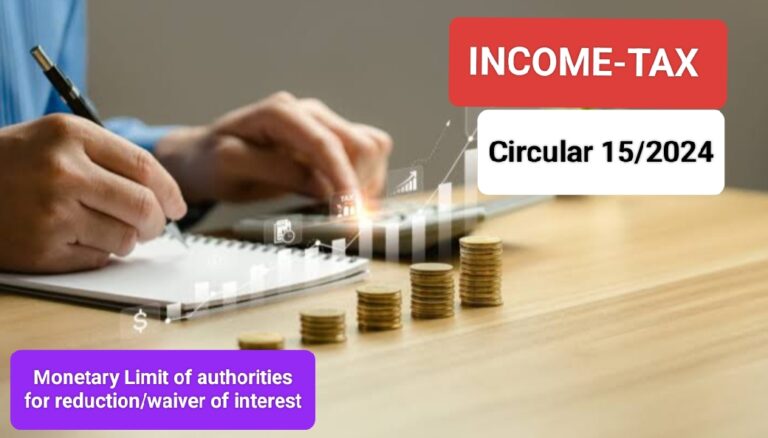Under Section 220(2A), certain income tax authorities have the power for reduction or waiver of interest, upon satisfaction of certain condition.
Reduction or Waiver of Interest: The Central Board of Direct Taxes (CBDT) has recently issued Circular No. 15/2024 on Dated 30 October 2024, Specifying the monetary limits that guide the reduction or waiver of interest under Section 220(2) of the Income Tax Act, 1961. Section 220(2) outlines the interest charges for taxpayers who fail to pay the tax amount specified in a demand notice issued under Section 156). When a taxpayer does not meet this demand within the prescribed timeline, he/she becomes liable to pay simple interest at a rate of 1% per month (or part of a month) for the period of delay in making the payment.
Additionally, under Section 220(2A), certain income tax authorities have the power for reduction or waiver of interest, given specific conditions are met. These authorities include the Principal Chief Commissioner of Income Tax (Pr. CCIT), Chief Commissioner of Income Tax (CCIT), Director General of Income Tax(GDIT), Principal Commissioner of Income Tax (Pr. CIT), and Commissioner of Income Tax (CIT).
Monetary Limits for Reduction or Waiver of Interest under Section 220(2)
The CBDT has specified monetary limits for different income tax authorities who may reduce or waive the interest amount. The limits are as follows:
| Sl. No | Income Tax Authority | Monetary Limit for Interest Reduction or Waiver |
| 1 | Pr. CIT / CIT | Up to Rs. 50 Lakhs |
| 2 | CCIT / DGIT | Above Rs. 50 Lakhs to Rs. 1.5 Crore |
| 3 | Pr. CCIT | Above Rs. 1.5 Crore |
These limits define the authority of each official to provide interest relief to taxpayers, depending on the total interest amount at issue.
Conditions for Granting Reduction or Waiver of Interest
For any waiver or reduction under Section 220(2) of the Income Tax Act, taxpayers must satisfy all the following conditions under Section 220(2A):
- Genuine Hardship: The payment of interest has caused or will cause genuine hardship to the taxpayer.
- Beyond Control: The delay or default in payment was due to circumstances beyond the taxpayer’s control.
- Cooperation with Authorities: The taxpayer has cooperated in inquiries related to the assessment or recovery proceedings.
These provisions are designed to support taxpayers who face genuine financial challenges and unforeseen circumstances affecting their tax payment.
This circular is effective immediately from its date of issue, and the specified monetary limits will guide all related cases hereafter.
To Access the CBDT Circular No. 15/2024 Dated 30.10.24 click Here
READ MORE
Input Tax Credit: Common Mistakes to Avoid While Claiming Input Tax Credit (ITC) under CGST Act 2017
5% GST Rate Applicable for Fly Ash Bricks with Less Than 90% Fly Ash Content: Gujarat HC Ruling
